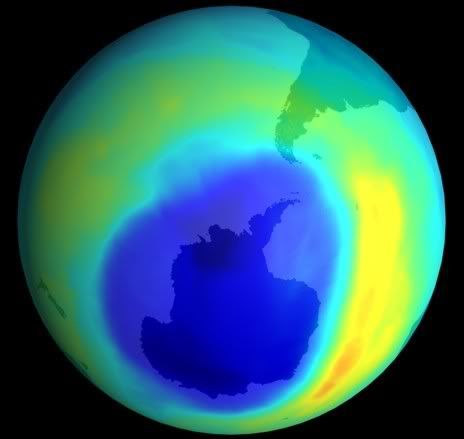Abrupt ice retreat there - Giant mosquitoes here
 Sea-ice 2000
Sea-ice 2000 Sea-ice 2040
Sea-ice 2040Images: UCAR
The "inspiration" for today's post came to me after a terrible night of constant mosquito attacks. I don't know if anybody else in Athens has noticed lately. But it's been way to warm for December with mean daily temperatures of 14 degrees Celsius and relative humidity reaching almost 100%. Greece is turning into Puerto Rico - no doubt.
As if all that wasn't enough to stress me out, today I stumbled upon another freakish announcement from the the National Center for Atmospheric Research (NCAR), that the recent retreat of Arctic sea ice is likely to accelerate so rapidly, due to GHGs, that the Arctic Ocean could become nearly devoid of ice during summertime as early as 2040.
The Community Climate System Model was used for this analysis. The scientists conclude that different rates of GHG emissions can affect the probability of abrupt ice loss. After another 15 leading climate models were tested, they found that if emissions of CO2 and other GHGs were to slow, the likelihood of rapid ice loss would decrease and summer sea ice would probably retreat at a much slower rate.
"Our research indicates that society can still minimize the impacts on Arctic ice", Marika M. Holland, the study's lead author, said.
"Our research indicates that society can still minimize the impacts on Arctic ice", Marika M. Holland, the study's lead author, said.
The study "Future Abrupt Reductions in the Summer Arctic Sea Ice", Authors: Marika M. Holland, Cecilia M. Bitz, and Bruno Tremblay, has been published in the December 12 issue of Geophysical Research Letters.
Labels: climate change, environment



9 Comments:
Daphne, please describe the mosquito situation in Athens. The last time I was there (way back in the late eighties) I was amazed to see no mosquitoes in Athens, all year round. I put it down to smog and general air pollution then. So things are very different now?
you ve been mentioned in guardian..
interesting about greece turning into puerto-rico. Not bad, was afraid that it would be a desert.
Harry: well its been very humid lately and living in the center has made me notice almost every night the presence of loads of mosquitos - in December!
Anonymous: what do you mean mentioned in the guardian? any links? desert or tropical island...hmm tough choice
Mentioned in the Guardian at:
http://blogs.guardian.co.uk/news/archives/2006/12/13/the_arctic_here_today_gone_in_40_years.html
Always was curious to the effect of global warming in greece.
What would it mean for the water supplies?
Puerto rico sounds promising at least. (not so sure about the mosquitos-malaria)..
Water shortage incidents are experienced in an increasing rate, resulting from the combination of increasing freshwater demand, climate change impact (increasing flood events during winter & droughts during summer) and diminishing rainfall. The most problematic regions are the Aegean islands and Crete. The Aegean islands have been experiencing a decline of rainfall at a rate of 15 mm/yr for the last 30 yrs. Although Greece is considered to be in a rather advantageous position, regarding the freshwater availability, compared to other Mediterranean countries, water resources are intensively exploited(80-84% of consumed freshwater/yr for irrigation purposes) through a problematic infrastructure resulting in major water losses.
The Greek FIRST NATIONAL REPORT ON THE IMPLEMENTATION OF THE UNITED NATIONS CONVENTION TO COMBAT DESERTIFICATION (2000) mentioned that as a result of the over exploitation of soil, water and vegetation resources, an area of about 15.233 km2 in the southern and central mainland, the Aegean islands and Crete is threatened by desertification (out of a total land surface of the country of 132.000 km2).
Daphne,
Hope that EU will finally decide to scrap the CAP and then there will bo not such high need for irrigation.
Perhaphs as a country they can focus more on the environment with the impending climate changes..
Dear Anonymous, thanks for yr comments so far, btw are you working in the environmental field yourself? I would be interested to hear about you/yr work, especially since your comments have been very interesting.
Sending email..
Post a Comment
<< Home